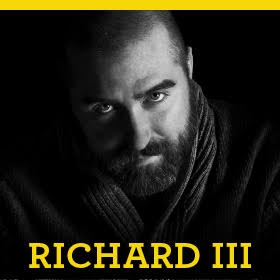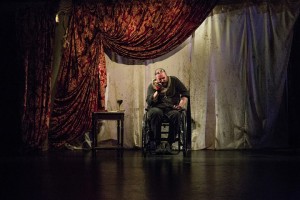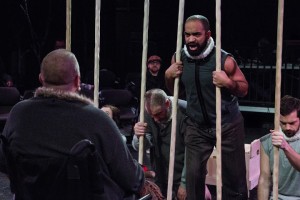A TOO-CASUAL CRUELTY
Macbeth, Claudius, Goneril, and Iago were monsters–horrible but not actual. Richard III, however, is Shakespeare’s vilest historical villain. In his short, ugly reign the last of the Plantagenets bathed in blood, offing all obstacles to the throne, including his two young cousins slaughtered in the Tower. He died in battle in 1485, broad sword in hand and hacked up like a slaughtered cow. Notoriously, his skeleton was recently discovered beneath a Leicester parking lot, revealing both his war wounds and the deformities that Shakespeare, writing for the triumphant Tudors, turned into scathing propaganda.
Gift Theatre takes Richard very, very literally: In Jessica Thebus’s problematic 150-minute revival, Michael Patrick Thornton, a veteran thespian who is also paraplegic, takes the title role. With no hesitation and fitting confidence, Thornton depicts a non-hunchbacked Richard in a wheelchair or wooden throne. Aided by computer-driven prosthetics, he is also assisted across the stage, as FDR was on public occasions.
In no way is this heartfelt and newly traditional casting a gimmick or even a concept. But the bedrock sincerity and immediacy it confers is, arguably, unwisely bestowed on the Bard’s truly loathsome “bunch-backed toad” and venomous spider. Richard’s bent and broken body is, to Shakespeare, emblematic of his evil. To undermine that politically incorrect association, Thornton would need to soften and sweeten the sinner or pretend that his paralysis (Richard’s or his own is an open question) puts him beyond the pale. In 2016 neither option brings a happy outcome.
As it happens, Thornton does neither. Because, intentionally or not, his Richard III is a very laid-back louse, full of trickery but minus technique, nuance or range. As if anticipating Hannah Arendt’s “banality of evil,” we hear Shakespeare’s vaunting soliloquies (“Now is the winter of our discontent”) succumb to a flat, uninflected, unemphatic and often flippant delivery, the timing either rushed or retarded. We seldom see the two sides of Richard’”his scheming solo self in cunning contrast to his hypocritical and deviously deceptive public persona. We hardly see one side.
Like Prospero, this manipulative monarch (who inserts himself into every scene) can control and conjure, even halt the stage action with an imperious “Stop!” But, dry, deliberate and matter-of-fact, this Richard doesn’t enjoy his vicious machinations. Worse, he’s too blatant in motive and manner to successfully seduce the wives and wheedle the courtiers who were also his victims.
As the play proceeds, the contrast sharpens and widens between the high-powered histrionics and passionate energy of the supporting actors (everybody but the king) and this grim reaper with no gravitas. Support, like Jenny Avery as the anguished and avenging sister-in-law or Thomas J. Cox’s explosive and doomed Clarence, shouldn’t stand out this much. In our Richard poetry that should take wing sounds perfunctory, bland or, worse, flowery’”and it’s excessive in everyone else.
An actors’ director, Thebus inspires everyone on Steppenwolf Garage’s crowded stage. We’re graced with strong work from established actors like Adrian Danzig as tormented Edward, Caroline Dodge Latta’s magnificently cursing mother, and Keith Neagle’s treacherous Buckingham. The ensemble prove as disciplined as any soldiers at Bosworth Field, and John Tovar’s deafening stage combat makes it a medieval action flick. But at its heart Richard III’”the character more than the play–is easily dismissed as a muddling middle manager turned toxic tyrant.
photos by Claire Demos
Richard III
The Gift Thatre
in collaboration with The Rehabilitation Institute of Chicago
Steppenwolf’s Garage Theatre, 1624 N. Halsted
Thurs – Sat at 8; Sat & Sun at 3:30
ends on May 1, 2016
for tickets, call 312.335.1650 or visit Steppenwolf
for more info, visit The Gift Theatre
for more theater info, visit Theatre in Chicago














{ 2 comments… read them below or add one }
I am so disappointed by your review. The play is my favorite of Shakespeare’s and Richard is my favorite villain (who else would kill a husband and brag about marrying the victim’s wife?).
I have yet to see the play (I have tickets for next Sunday and look forward to the story itself), but even if what you say is true, I believe that a mediocre Richard is better than none at all. The play is not only educational to the few people who are aware of this stage in English history, but it is so well written (I have read it several times) that the script alone is worth the price of admission. I wish you had told more of just how excellent the play is. I understand my take may be different AFTER I see the show, but I fear your review will scare many people away.
I second the comment above about it being a shame that this review might lead anyone to miss this fascinating performance. I just saw the play yesterday, and in fact, Thornton’s under-the-radar vocal delivery shows, paradoxically, an ability to display Richard’s natural power, and ability to trick and intimidate, beyond what any facile screaming or noisy bullying (is that what this reviewer wants to see?) could do. And what about the dramatic depth produced by Thornton’s wheelchair and exoskeleton? A viewer should marvel both at his courage in continuing to act after his stroke (I realize he’s been doing that for years, but this is the first performance I have seen by him), and how these modern devices symbolize the deformities which Richard is determined, by the most villainous means, to overcome.